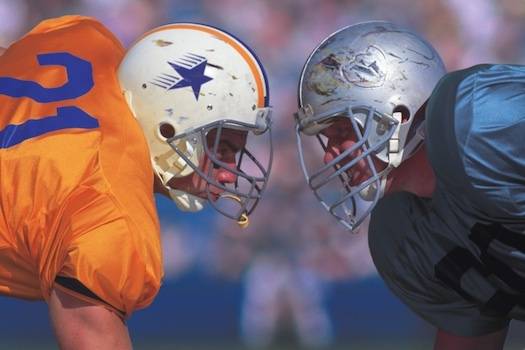

There’s plenty of evidence that repeated head hits in football—even if they don’t quite cause concussions—are associated with neurological problems later in life. Yet what exactly happens in the years between a hit and the appearance of symptoms such as memory loss and depression? What exactly causes the symptoms, and how might medicine prevent them?
One group of researchers has a new idea. Sub-concussive jostling to the brain could lead to a series of events that ends with cells in the immune system attacking the brain, says Jeffrey Bazarian, a physician at the University of Rochester Medical Center and a co-author on a new study about brain injury as an autoimmune response.
The study was preliminary and wasn’t set up to prove that immune cells are harming the brain. Instead, it found evidence that’s one step short of proof. The data “don’t really prove causality, so that’s why more work needs to be done, but I still think it’s provocative,” Bazarian tells Popular Science.
If brain injuries really do cause this terrible immune response, that means scientists could create a pill or vaccine to prevent it. “We could talk about, ‘How do we block this part of the immune response with some kind of immune suppressant?'” Bazarian says.
Here’s how Bazarian and his colleagues’ idea goes. After a head hit, even if it doesn’t result in a concussion, the blood-brain barrier that separates the brain from the rest of the circulatory system opens up, releasing a brain protein called S100B into the blood. High levels of S100B in the blood are already known as marker for head injury; in Europe, emergency rooms give head injury patients S100B tests to decide whether they need a CAT scan.
Bazarian and his team found that at the same time there’s all this S100B in the blood, the body also makes antibodies against the protein, which is normally found surrounding the brain but not in the blood. “So it looks like the body makes an antibody against a protein it’s not used to seeing,” Bazarian says.
That sets the body up so that the next time a head hit disturbs the blood-brain barrier, S100B antibodies in blood may pass through the barrier and attach to brain cells.
Bazarian calls this last part “speculation.” Among the evidence he’s found is that heightened antibody levels correspond to problematic brain scans and poorer performance on a cognitive test among the football players he and his colleagues studied. The researchers got their data from 67 University of Rochester and Cleveland Clinic football players who volunteered for detailed monitoring before and after games. None of the players the researchers studied had full-on concussions.
“I liked it that they concentrated on sub-concussive because that’s what we need to know about. Because as they said, in a season, you might get a thousand of these,” says Sue Griffin, a biologist who studies immune response in Alzheimer’s disease at the University of Arkansas for Medical Sciences. Griffin was not involved in Bazarian’s study. That lighter head hits might lead to a damaging immune response is “a possibility,” she says. “It needs to be investigated and they did a good job here.”
Griffin doesn’t happen to agree that the long-term symptoms of head hits are likely caused by an immune response. Studies of the brains of deceased professional football players with depressive or Alzheimer’s-like symptoms don’t seem to have undergone “wholesale systemic immune attack of the brain,” she says. Yet the study gathered good data and should be followed up, she says.
Other ideas scientist have about what’s so damaging about head hits include actual injury to the cells of the brain just from impact. Griffin is working on the idea that brain proteins sent to repair neurons after a hit stress the neurons over the long run.
Bazarian and his colleagues published their paper today in the journal PLOS ONE.
